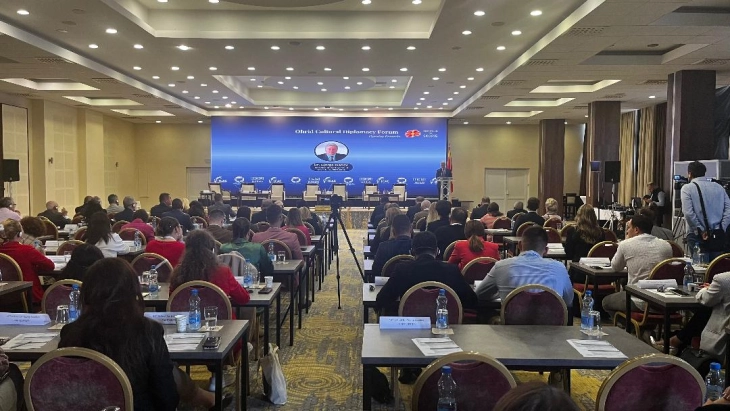School for Young Leaders: Young people, a driving force behind innovative solutions to complex global issues
- Young people are a driving force with immense potential for positive change. They are the driving force pushing innovative solutions to some of the world's most complex problems, from climate change to inequality and geopolitical tensions, all through diplomacy, intercultural dialogue, and cooperation. Their capacity to listen, learn, and gain insights from examples demonstrates that peace is not just an abstract ideal; it is something that can be actively achieved through mutual respect and shared objectives. This was emphasized by the speakers at the 15th School for Young Leaders, titled "Leadership for Peace," organized by the Office of former President Gjorge Ivanov in Ohrid.

Ohrid, 11 October 2024 (MIA) - Young people are a driving force with immense potential for positive change. They are the driving force pushing innovative solutions to some of the world's most complex problems, from climate change to inequality and geopolitical tensions, all through diplomacy, intercultural dialogue, and cooperation. Their capacity to listen, learn, and gain insights from examples demonstrates that peace is not just an abstract ideal; it is something that can be actively achieved through mutual respect and shared objectives. This was emphasized by the speakers at the 15th School for Young Leaders, titled "Leadership for Peace," organized by the Office of former President Gjorge Ivanov in Ohrid.

“The experiences gained from the last 15 leadership schools show that young people are seeking inclusive and empathetic leadership. In today's globalized world, leaders must be capable of embracing diversity and understanding the perspectives of various groups. Empathy and the ability to recognize and listen to the needs of all citizens, regardless of their ethnic, cultural, or social differences, are fundamental aspects of contemporary leadership. Young people are increasingly favoring transformative leadership, where leaders need to be visionaries who inspire others to pursue change,” Gjorge Ivanov said during his address to the participants of the event.
He stated that young leaders are increasingly inclined toward developing innovative solutions that contribute to long-term progress. They are committed to ethical leadership, which considers the welfare of all and is transparent in its processes. Ivanov asserted that this contributes to building citizen trust and ensuring political stability in the long run.
In a video address to young leaders, Foreign Minister Timcho Mucunski noted that cultural diplomacy in today’s world not only fosters a positive image but also enhances peace, tolerance, and mutual understanding among nations.

“Culture is an essential tool for preventing conflicts and strengthening international relations. Through culture, we can build mutual connections that are based not only on economic and political foundations but also on shared human values and rights. Participants in these schools first build friendships, develop leadership skills, and prepare for the challenges they will face in the future,” Mucunski said.
The Mayor of Ohrid, Kiril Pecakov, pointed out the significance of Ohrid as a key center for peace and dialogue. He noted that it is where the Ohrid Framework Agreement was signed, marking an important moment in recent history that brought an end to a conflict and paved the way for the stabilization of both the country and the broader region.
“Today's panel discussion tackles a topic that is vital for regional and international politics. In this age of globalization, the cultural bridges we build are essential for fostering mutual understanding. These bridges not only help us share our differences but also reveal what unites us. It is the responsibility and role of young leaders to reinforce these bridges and establish a network of friendships and cooperation that will strengthen our global peace,” Pecakov said.

To make the most of the potential that young leaders offer, it is vital for them to be actively involved in processes, institutions, and every area of social living and action.
Nonetheless, the statistics are not in favor of these goals. Over half of the global population consists of individuals under 30, but only 2.6 percent of them are directly engaged in political decision-making.
According to the report from the Inter-Parliamentary Union, youth representation in 193 national parliaments stands at just 2.87 percent. In 33 national parliaments, there are no representatives under the age of 30. In North Macedonia, the representation of youth in the Parliament is 2.5 percent.
Photo: MIA







